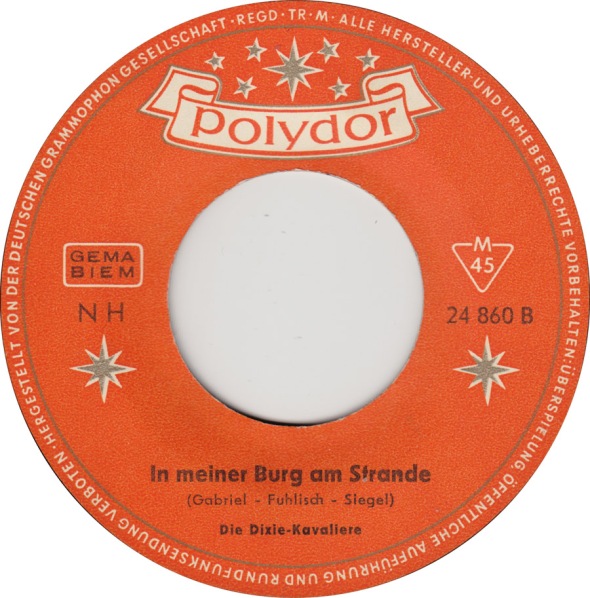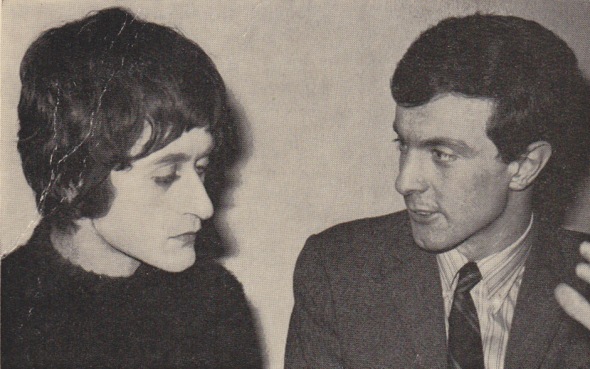DIE DIXIE-KAVALIERE, Amalie geht mit ´nem Gummikavalier, 1962
Posted: July 26, 2015 Filed under: 60s, Germany, Jazz Records Leave a comment


 It´s summertime, so here are two summer related Dixieland songs. The Dixie-Kavaliers were inspired by the success of the Old Merry Tale Jazzband who had a few hits mixing Dixieland and Schlager around the same time in the early 60s.
It´s summertime, so here are two summer related Dixieland songs. The Dixie-Kavaliers were inspired by the success of the Old Merry Tale Jazzband who had a few hits mixing Dixieland and Schlager around the same time in the early 60s.
Amalie is an uptated Dixieland version of an old German Jazz-Schlager. Max Raabe recently authentically revived the 1927 original, a so-called “Badesaison-Schlager” (bathing season hit song). In the 1920s, swim rings and other sorts of inflatable water toys, were called Gummikavalier. The song was written by Siegwart Ehrlich (1981-1941), a German jew, who was also known by his pseudonyms Victorio and Sydney Ward. Ehrlich wrote many songs for revues and musicals. In 1933, he fled Germany to escape the Nazis. He died in 1841 in Barcelona.
Trumpf ist die Mode der Seebadsaison,
man nimmt ins Wasser Tiere,
Hunde aus Gummi in jeder Façon,
Affen, Giraffen, Tapire.
Amalie fand das sehr apart,
doch hat sie ihre eig’ne Art.
Amalie geht mit ‘nem Gummikavalier,
mit ‘nem Gummikavalier ins Bad.
Amalie geht mit ‘nem Gummikavalier,
mit ‘nem Gummikavalier ins Bad.
Und sie pustet, und sie bläst ihn auf geschwinde,
an der Nordsee und im Wannsee, Travemünde.
Amalie geht mit ‘nem Gummikavalier,
mit ‘nem Gummikavalier ins Bad.
DIE DIXIE-KAVALIERE, Amalie geht mit ´nem Gummikavalier, 1962
Fittingly, In meiner Burg am Strande is also bathing-related. Originally written in1938 written by Ralf Maria Siegel, In meiner Burg was first recorded by Oskar Joost Tanzorchester. The name of Hamburg-based jazz musician and bandleader Günter Fulisch appears in the credits on both labels so I assume the Dixie-Kavaliere was one of his projects.
In my sand castle on the beach…
DIE DIXIE-KAVALIERE, In meiner Burg am Strande, 1962
ALFIE MORGAN, Ich bin so faul, 1968
Posted: July 2, 2015 Filed under: 60s, Germany, Political Records 2 Comments


 Ich bin so faul (I´m so lazy) is a song that praises laziness. Surprisingly up-to-date, its Sirtaki rhythm and melody makes it sounds like a conservative parody of the Greek crisis. If anything, the Greek people had to work harder than any other European nations in recent years, while the obedient Germans, wo caused the crisis through massive wage cuts and overblown exports, eat up all the bullshit lies of the mainstream propaganda machine. Hopefully the brave Greek government will prevail. If not, the entire European leftist project is at stake. Capitalists are already shitting their pants, as is evident in their recent hysteria.
Ich bin so faul (I´m so lazy) is a song that praises laziness. Surprisingly up-to-date, its Sirtaki rhythm and melody makes it sounds like a conservative parody of the Greek crisis. If anything, the Greek people had to work harder than any other European nations in recent years, while the obedient Germans, wo caused the crisis through massive wage cuts and overblown exports, eat up all the bullshit lies of the mainstream propaganda machine. Hopefully the brave Greek government will prevail. If not, the entire European leftist project is at stake. Capitalists are already shitting their pants, as is evident in their recent hysteria.
Ich bin so faul is not a parody. It expresses a genuine pleasure to be lazy. I love work, too. I work for a couple of hours every day. I might not earn much, but I´m happy, because I love what I do. But what´s wrong with being lazy, anyway? What we need today, is more laziness! With Capitalist rule unchallenged for decades and everybody brainwashed into believing there is no alternative, I can´t think of a more political statement. Work is our collective obsession. In the last two years, two of my friends committed suicide because of burnout/depression, and ensuing unemployment. Both felt worthless without a job. To me those tragedies are still unacceptable and I directly blame the Capitalist ideology.
No information on Alfie Morgan, apart from the liner notes stating that he appeared in “various films in France, Austria and England” and that” his friends Omar Sharif and Michel Polnareff persuaded him to record his German début single”.
The tiny Citycord label, located in Hamburg-Sasel, was founded by Manfred Dulau and Joe Moser in 1966. Moser also co-wrote “Morgen ist ein neuer Tag”. The music to Ich bin so faul (Ya Du travail) was written by young Janco Nilovic, later a composer of library music, with lyrics by Ernst Bader. Bader, both a Christian and a Socialist, wrote countless songs for stars like Freddy Quinn, Udo Jürgens, Catarina Valente, Nana Mouskouri, Adamo and most of the German lyrics to the songs of Charles Aznavour. Despite of his wealth, he lived a very modest life, giving most of his money away. He donated to the radical-leftist APO-Press, financed the St. Pauli Museum, that is still in existence today, and guaranteed in his will, that the tenants of his condominiums had life-long habitation rights at a low rent. Photographer Günter Zint, was a friend of Ernst Bader for forty years. When Bader died in 1999, he held his obituary.
Anyway, I love the unabashed praise of the virtues of laziness in this song…
ALFIE MORGAN, Ich bin so faul, 1968
Der Tag ist heiß,/ heiß weht der Föhn/ Oh, ich bin so faul/ Ach, ist das schön/ Die Andern ackern und schaffen für sich,/ aber keiner ist froh und zufrieden wie ich./ Wenn sie sagen, ich mach´ alles völlig verkehrt,/ich finde, auch mein Leben ist was wert./ Oh, ich bewund´re den emsigen Boss,/ ganz bestimmt fällt dem Mann das Geld nicht in den Schoß,/aber ich schau´ auf blühende Felder hinaus/ und ich ruh´ mich aus./Der Tag ist heiß,/ heiß weht der Föhn/ Oh, ich bin so faul/ Ach, ist das schön./ Da schlendert froh mit verliebtem Gesang,/ schon mein Mädchen am Morgen die Strasse entlang/ und sie setzt sich zu mir dann mit fröhlichem Blick./ Und dann träumen wir beide vom großen Glück./ Für dauren Küsse, da brauch´ ich kein Geld./ Wir geniessen mit offenen Augen die Welt./ Wenn die ander´n sich plagen, dann träumen wir süß/ wie im Paradies./ Der Tag ist heiß,/ heißweht der Föhn/ Oh, ich bin so faul/ Ach, ist das schön
ALFIE MORGAN, Morgen ist ein neuer Tag, 1968
Morgen ist ein neuer Tag is a German cover version of Gene Stridel´s northern soul classic Tomorrow Is Another Day on the Atlantic label.



 About me:
My name is Andreas Michalke. I´m a cartoonist from Berlin, Germany and I like collecting records. Most of the records I find in thrift stores or at flea markets here in Berlin. I like a lot of music but I thought I`d focus on odd German records. Preferably with cartoon covers.
All my scans are high-resolution. If you double-click on them they will get much bigger.
About me:
My name is Andreas Michalke. I´m a cartoonist from Berlin, Germany and I like collecting records. Most of the records I find in thrift stores or at flea markets here in Berlin. I like a lot of music but I thought I`d focus on odd German records. Preferably with cartoon covers.
All my scans are high-resolution. If you double-click on them they will get much bigger.
Recent Comments